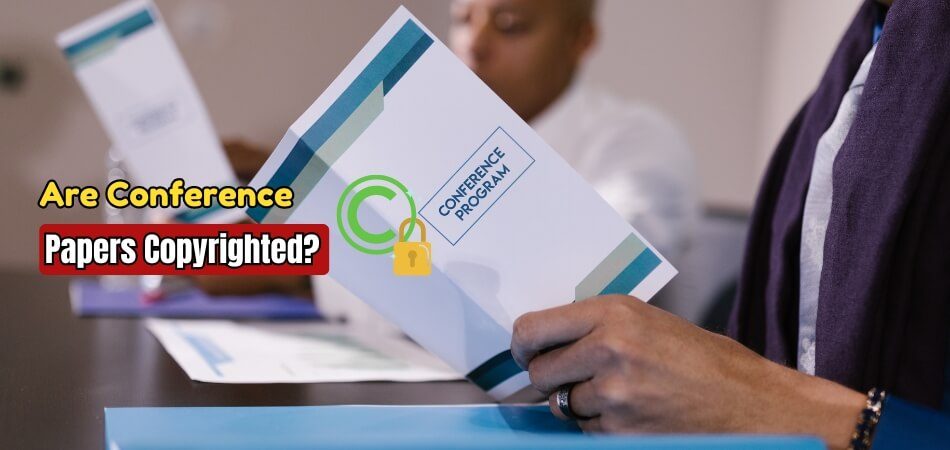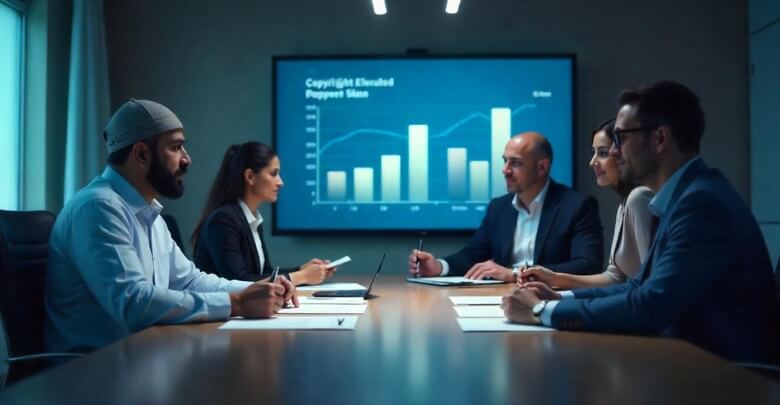Copyright is a critical aspect of academic publishing, especially for conference papers. Researchers put in considerable effort to create original work, but are conference papers copyrighted? Authors as well as attendees who wish to respect intellectual property must understand this.
Yes, conference papers are copyrighted. Copyright protection is granted automatically once the paper is created, securing the author’s rights to control its usage, reproduction, and distribution. However, specific agreements with conference organizers can sometimes affect this ownership.
In this article, we’ll explore how copyright laws impact conference papers, who holds the rights, and how you can protect your work. Keep reading to understand copyright’s role in safeguarding your research.
How Copyright Laws Apply to Conference Papers?
Before diving into the specifics of conference paper copyright, it’s crucial to understand how general copyright laws apply to such works. Copyright laws safeguard the author’s original creation, allowing them control over reproduction, distribution, and other uses of their work. Here’s how copyright laws relate to conference papers:
Automatic Copyright Protection
When an author creates a conference paper, copyright protection is automatically granted. There’s no need to apply for it, as the work becomes the author’s intellectual property upon creation. This automatic protection includes the rights to reproduce, share, and modify the work.
Copyright Transfer Agreement (CTA)
Authors may be required to sign a Copyright Transfer Agreement (CTA). This agreement transfers some or all rights to the conference organizers or publishers. The right to reuse an author’s work in other publications or presentations remains with some authors. Always read the agreement carefully before signing.
Distribution Rights
Authors can grant distribution rights to conference organizers. This allows the paper to be shared with attendees, stored in digital libraries, or included in conference proceedings. However, the authors often retain the right to use their work for personal or educational purposes.
Licensing Options
Authors can use licenses, such as Creative Commons, to allow wider usage of their conference papers. These licenses specify the extent to which others can use, modify, or distribute the work. It’s an effective way to maintain control while encouraging sharing within the academic community.
Reuse of Content
Authors should be cautious about reusing their conference paper content in other publications. If a copyright transfer agreement was signed, reusing substantial portions without permission may breach the agreement, leading to legal issues. Authors should consult the copyright terms of the original conference before republishing their work.
The knowledge of how copyright laws apply to conference papers can help authors protect their rights and avoid unintentional infringement.
Are Conference Papers Copyrighted?
Conference papers are indeed copyrighted. Copyright protection is automatically granted to authors as soon as the paper is created. This ensures the author’s rights over their work, including control over its reproduction, distribution, and modification. Now, let’s explore the factors that influence copyright in conference papers.
Copyright Transfer Agreements (CTAs)
Many conferences require authors to sign Copyright Transfer Agreements (CTAs) upon submission. This agreement often transfers certain rights from the author to the conference organizers or publishers.
While authors may retain some rights, such as reusing their work for teaching or future publications, they lose exclusive control over distribution and reproduction.
Co-authorship and Joint Ownership
If a conference paper has multiple authors, copyright becomes more complex. All authors typically hold joint ownership, meaning any changes, reuse, or publication of the work require mutual consent.
It’s crucial for co-authors to establish clear agreements regarding copyright terms to avoid conflicts later on. This is particularly important for papers presented at notable conferences to attend, where increased visibility may influence how rights are managed.
Reuse and Distribution Rights
Authors sometimes grant specific distribution rights to conference organizers, allowing wider access to the work. This might include online databases, conference proceedings, or digital libraries. However, authors usually retain personal use rights, enabling them to use the content for teaching, presentations, or further research.
Licensing Options
Authors can use licensing agreements like Creative Commons to allow broader use of their work while maintaining copyright.
These licenses offer flexibility, specifying whether others can reuse, modify, or distribute the paper, and under what conditions. It’s a useful option for authors who wish to share their findings without relinquishing all rights.
Registration of Copyright
While copyright is automatically granted, authors can choose to register their work for added legal protection. Registration strengthens the author’s claim to ownership and can serve as evidence in case of disputes. It’s especially helpful for authors who anticipate further use or distribution of their research.
Moral Rights
Even when copyright is transferred, authors retain moral rights over their work. This means they can demand proper attribution and prevent any misuse or derogatory treatment of their paper. Moral rights are key to protecting the author’s integrity and ensuring their work is respected.
The knowledge of these factors can help authors make informed decisions about protecting their intellectual property. By managing copyright effectively, authors can share their findings while safeguarding their rights.
Who Holds Copyright for Conference Papers?
Determining who holds copyright for conference papers can be confusing for authors and attendees. It often depends on the agreements signed before presenting the paper, but being aware of the basics can help authors maintain control over their work.
Author’s Copyright Ownership
Initially, authors hold the copyright for their conference papers. This means they have exclusive rights to reproduce, distribute, and display their work. However, copyright ownership can change if the author signs a Copyright Transfer Agreement (CTA), which shifts some or all rights to the conference organizer or publisher.
Conference Organizers and Copyright Transfer Agreements (CTAs)
Some conferences require authors to sign a CTA before presenting their papers. This agreement can transfer the copyright to the organizer or publisher, allowing them to reproduce and distribute the work.
Authors should carefully review CTAs to understand which rights they’re relinquishing and which they retain. Being familiar with these agreements is crucial to preserving the scholarly value of conference papers, ensuring authors can maintain their contribution’s integrity.
Open Access and Licensing
In some cases, authors can retain copyright while granting certain usage rights through open-access licenses, such as Creative Commons. These licenses allow wider sharing and reuse while protecting the author’s ownership. It’s a flexible option that maintains authors’ rights while encouraging academic collaboration.
Copyright ownership for conference papers largely depends on the author’s decisions and the terms of submission. By learning about the agreements, authors can make informed choices to protect their intellectual property and share knowledge effectively.
Can You Use Conference Papers Without Permission?
Using conference papers without permission can be a tricky matter, especially for researchers and students eager to access quality content. While these papers offer valuable insights, it’s important to understand how copyright laws apply to their use. Unauthorized use can lead to legal consequences, so let’s break down the dos and don’ts.
Personal Use
You can read or download a conference paper for personal study without seeking permission, as long as it is not for commercial purposes. This includes activities like taking notes or referencing ideas in your research. However, any reproduction, even for personal use, must respect copyright laws.
Academic Citation
If you’re citing a conference paper in your research or publication, permission is not required as long as you provide proper attribution. Accurate citations credit the author while preventing plagiarism. However, excessive use of content or reproducing tables and figures may still need permission.
Reproduction and Distribution
Reproducing, distributing, or sharing conference papers without the author’s permission is generally prohibited. This includes sharing papers online, printing for mass distribution, or using content in presentations. Authors retain exclusive rights, so always seek permission before making copies.
Commercial Use
Using conference papers for commercial purposes, such as in corporate training or product development, is not allowed without explicit consent from the copyright holder. This is considered copyright infringement, which can result in legal penalties.
While conference papers are valuable resources, using them responsibly ensures respect for authors’ rights. Always seek permission when in doubt, as it’s better to be safe than to face copyright issues.
How to Protect Your Copyright for Conference Papers?
Protecting your copyright for conference papers ensures that your hard work and research remain secure. By taking the right steps, you can maintain control over your intellectual property while allowing its appropriate use in academic circles. Here are some key measures to consider.
Include a Copyright Notice
Adding a copyright notice to your paper is a simple but effective step. Place it on the title page or at the bottom of the document, clearly stating that the work is protected by copyright. This makes it evident to readers that the paper cannot be reproduced or used without permission.
Register Your Copyright
While copyright is granted automatically, formal registration can offer added legal benefits. Registering your work with the appropriate copyright office provides solid proof of ownership. Regardless of the publication status of conference papers, registration strengthens your legal claims in case of infringement.
Use Creative Commons Licenses
Consider using a Creative Commons license to specify how others can use your work. These licenses allow you to set terms, like permitting reuse for non-commercial purposes or requiring proper attribution. This makes sharing easier while keeping your rights intact.
Negotiate Copyright Terms
If a conference organizer requires a copyright transfer agreement, try to retain some rights. For instance, request permission to reuse your work in future publications or presentations. Discussing these terms early on can help you protect your rights without losing opportunities.
Monitor for Infringement
Stay proactive by checking academic databases and websites for unauthorized use of your paper. Set up alerts or use tools that can detect if your work has been copied without permission. Taking action promptly can prevent further misuse and protect your reputation.
By following these steps, you can secure your rights effectively. Remember, taking control of your copyright is essential to safeguarding your research.
What Are the Consequences of Copyright Infringement?
Copyright infringement can have serious repercussions, especially in the academic world. It not only affects the original author but also damages the reputation of the person or entity violating the copyright. Here are some consequences of copyright infringement:
- Legal Penalties: Violating copyright laws can lead to lawsuits. Infringers may face hefty fines, legal fees, or even jail time, depending on the severity of the case and local laws.
- Monetary Damages: In some cases, infringers might be ordered to pay compensation for the financial loss caused by the unauthorized use of copyrighted work. This can include lost profits, licensing fees, or statutory damages.
- Damage to Professional Reputation: Infringement tarnishes the credibility of the infringer within the academic or professional community. It can lead to mistrust, limiting future opportunities for collaboration or publication.
- Restricted Access to Conferences and Journals: Individuals who violate copyright laws may face bans from participating in conferences, submitting papers, or publishing in academic journals. This could significantly limit their research exposure and networking opportunities.
- Loss of Publishing Opportunities: Copyright infringement can result in blacklisting by publishers. Authors may find it challenging to get their work accepted by reputable journals or conferences if they have a record of copyright violations.
- Cease-and-Desist Orders: Infringers may receive legal notices demanding the immediate cessation of unauthorized use. This can halt ongoing projects or research, causing significant delays and additional costs.
- Loss of Research Grants or Funding: Funding bodies often review the ethical practices of researchers. Copyright infringement can lead to the withdrawal of research grants, affecting ongoing studies and the author’s academic career.
Copyright infringement has far-reaching consequences, affecting both the infringer and the academic community. Upholding copyright laws is crucial to maintaining integrity and trust in academic research.
Frequently Asked Questions
When it comes to understanding copyright for conference papers, there are several questions that often arise. Here’s a list of frequently asked questions to further clarify this topic. These answers will help you deal with the complexities of conference paper copyright.
Do Conference Papers Need To Be Registered For Copyright?
No, copyright registration is not required for conference papers. Copyright is automatically granted upon creation. However, registering a paper can provide extra legal protection and stronger evidence of ownership in case of disputes.
Can I Use A Part Of A Conference Paper In My Thesis?
Yes, you can use portions of a conference paper in your thesis, but proper citation is required. It’s important to credit the original author, even if you are the author of both works, to maintain academic integrity. Always check the copyright agreement terms before reuse.
Is It Possible To Co-Author A Copyrighted Conference Paper?
Yes, a conference paper can have co-authors, and all co-authors share copyright ownership unless otherwise agreed upon. Co-authors must collaborate on how the work is used, distributed, or modified. Clear communication and agreement among co-authors are crucial.
Can I Present The Same Paper At Multiple Conferences?
Absolutely! You can present the same paper at different conferences, provided there are no restrictions from the original conference’s copyright agreement. Always check the terms to avoid any breaches of copyright or exclusivity clauses.
Are Conference Posters Copyrighted The Same Way As Papers?
Yes, conference posters receive the same copyright protection as papers. Posters, being original works, are automatically copyrighted upon creation. This ensures that the creator’s intellectual property is protected from unauthorized use or reproduction.
Conclusive Words
Copyright is essential for protecting the intellectual property of researchers. So, are conference papers copyrighted? Yes, they are. Copyright ensures authors maintain control over how their work is used, reproduced, or shared within the academic community.
For authors, learning copyright laws is key to securing their rights. Be aware of agreements with conference organizers, as these can impact your ownership and ability to reuse your work. It’s wise to negotiate terms that allow you to retain certain rights, like using the paper for further research or teaching.
By taking proactive steps, you can protect your work while still contributing to the broader research community. Prioritize ethical practices and maintain transparency to uphold credibility and foster a culture of trust in academia.









I appreciate how easy you made this to follow.